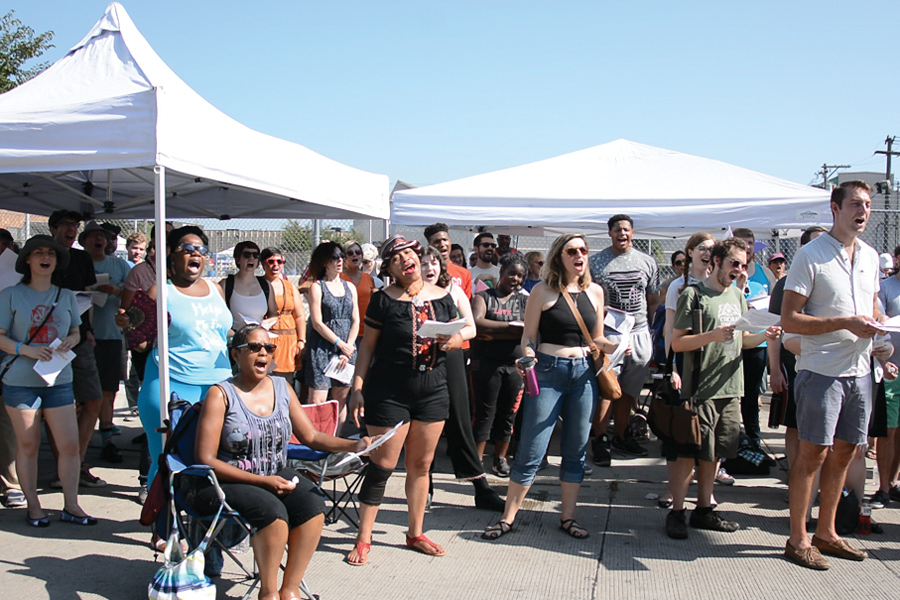American premiere of vocal piece to combine 1,000 Chicagoland voices
(Hangda Zhang/Daily Senior Staffer)
A group of Chicago singers rehearses David Lang’s “crowd out” for 1,000 voices, which will have its American premiere in Millennium Park on Oct. 1.
September 28, 2017
Grammy Award-winning flutist Tim Munro was long compelled to find ways to break down the performer-audience divide in music productions.
To achieve this goal, Munro invited groups from all around Chicago for the American premiere of a multiple-ensemble piece. David Lang’s “crowd out” — a composition written for 1,000 or more voices — will be performed Sunday in Millennium Park for a single performance.
“I’ve been more and more frustrated as a classical musician between the distance that we, as performers, have from the audience — both in terms of our perceived skill level and also in the sense of actual physical distance,” said Munro, who serves as the co-music director for the event. “I’ve been searching for projects that kind of explode that and imagine what a united musical community could be.”
Lang is a Pulitzer prize-winning composer based in New York who created “crowd out” in 2014. The piece will be principally conducted by Donald Nally, the director of choral organizations at Northwestern. The Bienen Contemporary/Early Vocal Ensemble and University Chorale will also represent NU at the event.
The Oct. 1 performance will kick off the Chicago Humanities Festival, a month-long event that brings together various local cultural groups. Paul Durica, director of programs at Illinois Humanities, said his team was “immediately intrigued” both by the piece itself and the challenge to bring together so many people for a single event.
“We saw it as a singular opportunity to try to create an experience that engages all areas of the city,” Durica said. “I wanted to make it as representative of Chicago as possible.”
Durica added that he wanted to bring in a diverse assortment of singing groups to represent all of Chicago’s 50 wards. Performing groups, which have been rehearsing since July, range from elementary school choirs to church choirs, and in some cases, just groups of engaged community members.
“What’s going to make this so meaningful is when people see things that represent the range of the city in terms of age, background, geography and experience,” Durica said. “Oftentimes, it’s very rare for people to kind of move across neighborhoods and communities to share an experience.”
The piece is written so that people of all ages can participate and no experience is necessary, Durica said. “Crowd out” features a mixture of singing, spoken word performance, clapping and call-and-response.
Munro said the score for the piece is more accurately described as a script. All words that participants are instructed to say and shout are printed on posters, rather than notated on sheet music.
“The piece should be, at its best, engaged with people who don’t have the most beautiful voices or aren’t used to performing,” Munro said. “There’s a lot of independence within each little group. It’s not a piece that’s centrally conducted except for two or three moments, it’s more about waves of activity.”
The work itself has eight sections and lasts about 45 minutes, Durica said. However, the duration is flexible because it relies upon the conductor’s musical whims.
Nally, the NU choral director, said the piece explores the “incredible power of massed people.”
“I love the fact that David is asking questions about what a performance is, how a listener in this crazy media-saturated world (receives) a performance or music,” Nally said. “There’s all of these questions going on in the piece and I don’t think there’s necessarily answers.”
To create lyrics for the piece, Lang searched on Google, “When I’m in a crowd, I feel,” and let the platform autofill the sentence, Munro said. In this way, Lang chose the most salient results to capture a range of human experiences and feelings.
“David is one of the most beautiful, sensitive, intelligent passionate minds in the classical music biz,” Nally said. “He is a very special person and is like the ultimate solver of problems.”
Munro said the full 1,000 people will not gather all together until the day of the event, when they have a short rehearsal. This is contrary to standard performance practice and will contribute a level of spontaneity to the premiere.
Munro called the piece an “emotional journey.”
“You have these moments of beauty and a feeling of confidence … helplessness and sometimes actual terror,” he said. “It’s a perfect piece, but it’s incredibly hard to pull off.”
Email: jenniferhepp2020@u.northwestern.edu
Twitter: @jenniferhepp97



